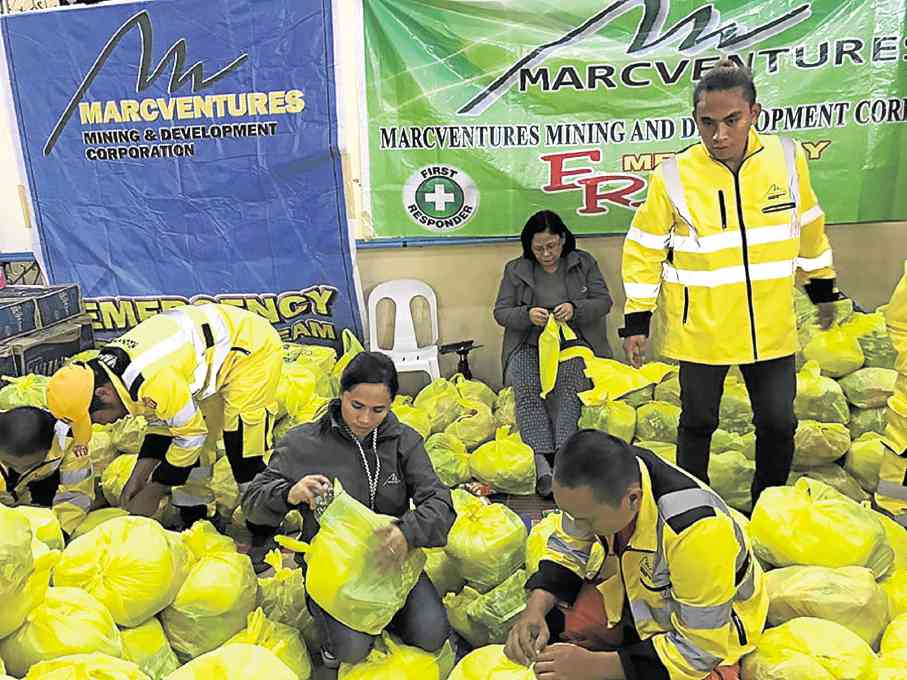
Employees of a mining company in Surigao del Norte help in packaging relief goods for earthquake victims. — CONTRIBUTED PHOTO
SURIGAO CITY—Businesses and private organizations have stepped in where government response has lagged in the continuing effort to assist thousands of residents who suffered from power outage and lack of water supply following the 6.7-magnitude earthquake that hit this city on Friday night.
The number of deaths from the tremor rose to eight, after Romel Tamo, 17, died on Sunday night due to a severe head injury. The number of injured rose to 209, according to a report from the Provincial Disaster Risk Reduction and Management Council of Surigao del Norte province.
Nongovernment relief efforts are being led by the Chamber of Mines-Caraga Region Inc. (CMCRI), whose members have mobilized hundreds of personnel for distribution of relief goods. Mining companies also deployed water trucks to provide thousands of residents with potable water supply enough for three days.
Jose Graellos of the Marcventures Mining and Development Corp. said the firm’s water rationing was focused on upland villages after water supply returned in some areas in Surigao’s downtown on Monday.
Roger de Dios, regional director of the Mines and Geosciences Bureau-Caraga, said the assistance from mining companies included basic necessities, medical aid and standby search and rescue teams.
Dulmar Raagas, CMCRI president, said their members would donate construction materials to help repair damaged schools and other government buildings.
Donations
Social Welfare Secretary Judy Taguiwalo has appealed for cash donations to buy water for residents of Surigao City and four neighboring towns whose water supply was cut off after Friday’s earthquake.
While relief supplies are available, “there is no way that people can function well and survive without a steady supply of water for drinking and for other household needs,” she said.
“[Repairs] will not be completed soon so we must prepare contingency plans to make sure that people in Surigao will have water to drink,” she said.
The Department of Social Welfare and Development (DSWD) Caraga office had delivered 3,100 bottles of water, in containers of 6.6 liters and 4 liters, to the Surigao City government.
“Filipinos who want to help our kababayans in Surigao can donate cash to the DSWD and we will immediately purchase more drinking water which we will distribute to communities,” said Taguiwalo, who flew to Surigao with President Duterte on Sunday to check on the aid distribution.
Health Secretary Paulyn Ubial asked earthquake survivors to sterilize their drinking water even if they believed that it came from safe sources.
Cash donations can be deposited to the DSWD’s account with Land Bank of the Philippines Batasan branch in Quezon City.
For peso-denominated donations, the account name is DSWD Donation under account number 3122-1011-84. For dollar-denominated donations, the account name is DSWD Foreign Donation under account number 3124-0055-81 and swift code TLBPPHMMXXX.
Taguiwalo asked donors to notify the DSWD of their donations either through phone or email (finance@dswd.gov.ph or cash@dswd.gov.ph) and to fax the bank deposit slip with the donor’s name, nationality and address at (02) 931-8127.
Infra losses
The National Disaster Risk Reduction and Management Council placed the initial damage to infrastructure at P108.45 million. The number of damaged houses reached 1,034, with 155 severely damaged.
Losses arising from school damage due to the earthquake reached P7.6 million, the Department of Education (DepEd) said.
Initial assessment conducted by the DepEd showed that at least eight schools sustained heavy damage with major cracks observed in classroom walls and floors.
The Philippine Institute of Volcanology and Seismology (Phivolcs) said it recorded 101 aftershocks as of Saturday 4 p.m., and at least 18 aftershocks occurred in the vicinity of Surigao City, which was close to the epicenter of Friday’s earthquake.
“The aftershocks may continue to occur for several days to weeks, some of which may be felt. However, the probability of an earthquake (measuring) higher than a 6.7 magnitude to occur is low,” Phivolcs said in a report on Sunday.
Phivolcs reminded residents to be cautious of structures and places with signs of damage as these may be further damaged by aftershocks.
Trade Secretary Ramon Lopez said a price freeze on basic goods had been imposed after the city was declared under a state of calamity.
The Department of Energy said it imposed a 15-day price freeze on prices of liquefied petroleum gas and kerosene.
President Duterte, during his visit here on Sunday, announced a total financial aid of P2 billion to cover infrastructure repair and livelihood package for earthquake victims.
In Cebu, the provincial government has allocated P1 million in financial aid for Surigao City, while the Mandaue City government has committed to give P100,000.
Acting Cebu City Mayor Edgar Labella said he was proposing a P500,000 donation to Surigao City.
Minda Ocleasa, a resident of Cebu City, decided to scrap a party she was planning for her 74th birthday on Feb. 21 so she could donate the P5,000 she set aside for food to earthquake victims in Surigao.
“It’s not easy. It is so difficult to be a victim of an earthquake,” Ocleasa said, citing her experience when a 7.2-magnitude earthquake rocked Bohol province on Oct. 15, 2013, and damaged the ground floor of her family’s ancestral home in Maribojoc town.
“It took us two years to [complete the] repairs our ancestral home. I had to spend two summers in Maribojoc to oversee the repairs,” she said. —REPORTS FROM DANILO V. ADORADOR III, DORIS C. BONGCAC, JOCELYN R. UY, DONA Z. PAZZIBUGAN, AIE BALAGTAS SEE, CYNTHIA D. BALANA AND JULIE AURELIO